|
|
|
Sort Order |
|
|
|
Items / Page
|
|
|
|
|
|
|
| Srl | Item |
| 1 |
ID:
133719
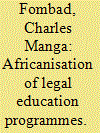

|
|
|
|
|
| Publication |
2014.
|
| Summary/Abstract |
Debates and discussions about the African renaissance and the Africanisation of universities have raged for decades. The goal of developing an emancipatory Afrocentric system that frees African education from the continuous and dominant influence of Euro- and American-centric cultural values remains a challenge. This is particularly so with respect to conventional African legal training and research programmes. Some African legal scholars, sometimes imbued with xenophilia, have in many ways participated in the process that has seen the continuous marginalisation of studies on the law in Africa and African law. This paper argues that there is a need to rethink the place devoted to the study of African law and African legal systems. It contends that African law generally and African legal systems specifically will hardly be able to develop when present-day students spend most of their time, especially in a course such as comparative law, studying western legal systems. In order for African legal education to be relevant and meaningful it must prepare and equip today's lawyers to operate in a global world. It is therefore suggested that an Africanised legal programme should include a course on African legal studies and aim to be contextually and globally relevant whilst being sufficiently innovative and flexible to address the urgent needs of our times.
|
|
|
|
|
|
|
|
|
|
|
|
|
|
|
|
| 2 |
ID:
174087
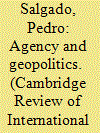

|
|
|
|
|
| Summary/Abstract |
The main narratives that explain the development of the modern international order fall short of incorporating the historical peculiarities of processes of state-formation in non-European contexts. To overcome that limitation, this paper argues that class agency must be taken as a core element to understand the social and geopolitical struggles that shape each case of transition towards modern sovereignty in its historical particularity. This is informed by the Brazilian historical experience. In that case, statehood can only be understood as an outcome of the disputes of its ruling landowning class against Portuguese colonialism, mediated by the British informal empire throughout the 19th century. In order to bring all these elements together, I follow the tradition of political Marxism to reconceptualize the very notion of “geopolitics” by grounding it in class-based strategies of reproduction and spatialization. The result is an agency-centred and radically historicist theoretical framework that rejects structuralist transhistorical logics of development. It also argues against the latent Eurocentrism present in theories of state-formation that are grounded on the European experience and simply transposed to other contexts by stressing the agency of non-European subjects in the making of their own history.
|
|
|
|
|
|
|
|
|
|
|
|
|
|
|
|
| 3 |
ID:
121825
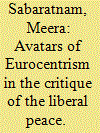

|
|
|
|
|
| Publication |
2013.
|
| Summary/Abstract |
Recent scholarly critiques of the so-called liberal peace raise important political and ethical challenges to practices of postwar intervention in the global South. However, their conceptual and analytic approaches have tended to reproduce rather than challenge the intellectual Eurocentrism underpinning the liberal peace. Eurocentric features of the critiques include the methodological bypassing of target subjects in research, the analytic bypassing of subjects through frameworks of governmentality, the assumed ontological split between the 'liberal' and the 'local', and a nostalgia for the liberal subject and the liberal social contract as alternative bases for politics. These collectively produce a 'paradox of liberalism' that sees the liberal peace as oppressive but also the only true source of emancipation. However, the article suggests that a repoliticization of colonial difference offers an alternative 'decolonizing' approach to critical analysis through repositioning the analytic gaze. Three alternative research strategies for critical analysis are briefly developed.
|
|
|
|
|
|
|
|
|
|
|
|
|
|
|
|
| 4 |
ID:
105932
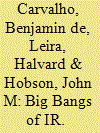

|
|
|
|
|
| Publication |
2011.
|
| Summary/Abstract |
International relations as we know them emerged through the peace of Westphalia, and the discipline of International Relations emerged in 1919 and developed through a First Great Debate between idealists and realists. These are the established myths of 1648 and 1919. In this article we demonstrate how historical and historiographical scholarship has demolished these myths, but that the myths regardless are pervasive in the current textbooks that are used in teaching future IR scholars. Disciplinary dialogue seems to have failed completely. Based on a detailed reading of the myths and their perpetuation, we discuss the consequences of the discipline's reliance on mythical origins, why there has been so little incorporation of revisionist insight and what possibilities there are for enhancing the dialogue.
|
|
|
|
|
|
|
|
|
|
|
|
|
|
|
|
| 5 |
ID:
161538
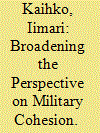

|
|
|
|
|
| Summary/Abstract |
It is difficult to underestimate the importance of cohesion for armed groups or organizations specialized and engaged in organized violence. This article argues that the recent debate on military cohesion has been far too narrow as it focused on Western state militaries during the 20th and 21st centuries, and even then only on the microlevel. It is necessary to broaden the perspective in order to construct theories that encompass even the vast majority of armed groups—the non-Western, nonstate, and nonmodern. This article advocates two ways of doing so: the investigation of cases that belong to these three types and broadening analysis to two new levels of analysis—the meso-level of armed groups and the macro-level, which contains state and society. Cohesion is established through harmonizing these three levels, which necessitates including them in the analysis in the first place.
|
|
|
|
|
|
|
|
|
|
|
|
|
|
|
|
| 6 |
ID:
111552
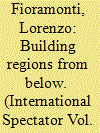

|
|
|
|
|
| Publication |
2012.
|
| Summary/Abstract |
In a changing world ridden with crises and characterised by a general redistribution of power, regional organisations need to reinvent themselves. Equally, the study of regionalism has to reject its traditional Eurocentrism to embrace new conceptual categories in order to describe more effectively the variety of regional processes across the world. Against this background, this article looks at the European project and its current crisis before discussing other regional 'experiments' in Africa, Asia and Latin America, which rest on different principles but also manifest considerable shortcomings. The analysis points to the need to look at regionalism with a critical eye, emphasizing the undeniably important achievements but also the hidden threats that a certain model of regional integration (for instance, the classical top-down elite-driven process adopted by the EU founding fathers) can pose to the sustainability of regional cohesion and the adaptability of this model to other areas of the world.
|
|
|
|
|
|
|
|
|
|
|
|
|
|
|
|
| 7 |
ID:
077204
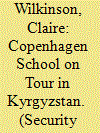

|
|
|
|
|
| Publication |
2007.
|
| Summary/Abstract |
The article argues that the theoretical framework presented by the Copenhagen School is currently unsuited to empirical studies outside the West owing to two factors. First, the presence of the 'Westphalian straitjacket' has prevented explicit interrogation of the normative concepts underlying the framework: there is a presumption that European understandings of society and the state are universal. Second, the centrality of the speech-act for securitization to the exclusion of other forms of expression, such as physical action, results in the theoretical framework producing a Westernized description of a given situation. The extent to which these factors limit the utility of the concepts of securitization and societal security in a non-Western setting is illustrated through the case of the overthrow of the government in Kyrgyzstan in March 2005. This example forms an empirical critique to highlight how theoretical shortcomings result in a simplified and Westernized description of the situation that does not take into account the specific local socio-political context. The article concludes that if the Copenhagen School's theoretical framework is to be considered suitable for universal application, future theoretical developments must explicitly address the issues discussed to enable progress in escaping International Relations' Westphalian straitjacket
|
|
|
|
|
|
|
|
|
|
|
|
|
|
|
|
| 8 |
ID:
155149
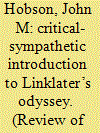

|
|
|
|
|
| Summary/Abstract |
This article provides an ‘engaged’ introduction to this forum on Andrew Linklater’s recently published book, Violence and Civilization in the Western States-Systems. I call this ‘engaged’ because I seek to adjudicate between the critics and Linklater’s book in the hope of building a bridge over troubled water. Given that the key word that underpins many of this forum’s contributions is Eurocentrism, I explore whether, and if so to what extent, Linklater’s book is Eurocentric. While I too identify various Eurocentric cues, I also provide various defences for Linklater. In particular, the final section advances two definitions of Eurocentrism and anti-Eurocentrism. Although I identify elements of ‘Eurocentrism I’ (the elision of non-Western agency and reification of the West) in his book, Linklater might respond to the principal forum complaint that he accords little or no role to non-Western actors and processes in the Western or global civilizing process by appealing to an alternative anti-Eurocentric approach: ‘anti-Eurocentrism II’ (which focuses squarely on Western imperial power and ignores or heavily downplays non-Western agency). I close by critiquing his left-liberal cosmopolitan politics, arguing that his Eurocentric-universalist normative posture cannot create the kind of peaceful and harmonious world that he (and Kant) so desires.
|
|
|
|
|
|
|
|
|
|
|
|
|
|
|
|
| 9 |
ID:
151482
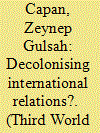

|
|
|
|
|
| Summary/Abstract |
How do we ‘decolonise’ the field of International Relations? The aim to decolonise has become a widely discussed and mentioned subject across the social sciences and humanities. The article aims to discuss what 'decolonisation' might mean in the context of the field of International Relations.
|
|
|
|
|
|
|
|
|
|
|
|
|
|
|
|
| 10 |
ID:
105927


|
|
|
|
|
| Publication |
2011.
|
| Summary/Abstract |
In this article I seek to decolonise the grounding of dialogue within the Europe-modern condition. I do so by working through two authors who are indispensable to the current canon of IR theory, Immanuel Kant and Michel Foucault, and one author who is largely missing from the canon, Édouard Glissant, the Martiniquean poet and literary critique. With regards to Kant and Foucault, I show how within both there exists at the same time a strong endorsement of the policing of ethical inquiry on the grounds of the European-modern and a weaker resistance to it. With regards to Glissant, I focus on his set of essays entitled Caribbean Discourse to show how he strongly endorses a relational pluralising of the grounds of ethical inquiry while at the same time retaining a weaker accommodation to the European-modern. In the course of these discussions I present each author's assessment of an adequate ethical faculty in the form of a figure: in Kant, the enlightened philosopher; in Foucault, the creative work of art; and in Glissant, the maroon. In the final section I rehearse a dialogue amongst the three figures that opens up the grounds of ethical inquiry to decolonising impulses.
|
|
|
|
|
|
|
|
|
|
|
|
|
|
|
|
| 11 |
ID:
192307
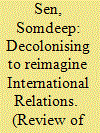

|
|
|
|
|
| Summary/Abstract |
Seeing as colonialism is ubiquitous to where International Relations (IR) comes from, what it explains and who it represents, many have argued that the decolonisation of the discipline is impossible. However, in this agenda-setting introduction, I place decolonisation squarely in the realm of possibility and ask, ‘what would a decolonised field look like?’. In answering this question, the contributions in this forum take point of departure from varied sites within the discipline, as they seek to materialise real change that reimagines what IR is and does as a discipline that was established as a scholarly defence for colonialism. Herein they propose decolonisation as a structure that upends the discipline’s colonial epistemological roots, rethinks core concepts and underlines the need to forefront geographies, peoples, and perspectives that were underrepresented in a colonial discipline. Equally, they recognise that decolonisation is a messy affair, that takes a non-linear trajectory. However, seeing as colonialism did not just inflict material impoverishment but also sought to alienate the colonised from their sense of self, this messiness is only expected. So, rather than be discouraged by this, this forum views the non-linear trajectory to be an unavoidable facet of any attempt at decolonising the discipline.
|
|
|
|
|
|
|
|
|
|
|
|
|
|
|
|
| 12 |
ID:
183726
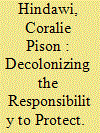

|
|
|
|
|
| Summary/Abstract |
Many postcolonial or critical scholars are rather sceptical of the Responsibility to Protect principle. In most of the critical literature, Responsibility to Protect (R2P) is presented as a product from the West, whose liberal ideal relies on a perception of Southern states being potentially dysfunctional, which in turn justifies an interventionist discourse with neocolonial overtones. The problem with this interpretation of R2P is that it essentially ignores non-Western, particularly Southern, inputs on the concept, falling precisely into the trap that, many authors claim, vitiates Responsibility to Protect: its West-centrism. Building upon a mix of critical, decolonial, postcolonial and Third World Approaches to International Law scholarship, this article proposes a number of additional steps to decolonize R2P in an effort to avoid what Pinar Bilgin describes as ‘conflating the critiques of the particularity of universals with critiques of the idea of having universals’. What successive decolonizing layers expose is a negotiation process in which the agency of states from the global South in shaping the – still controversial – principle has proved particularly obvious. Decolonizing Responsibility to Protect, this article argues, requires critical scholars to engage in a contrapuntal analysis in order to acknowledge the concept’s mutual constitution by the West and the ‘rest’ and the deeper struggles over universals hiding underneath.
|
|
|
|
|
|
|
|
|
|
|
|
|
|
|
|
| 13 |
ID:
145136
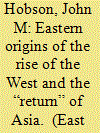

|
|
|
|
|
| Summary/Abstract |
With the current interest in China (and India) proliferating within the Western Academy, this article claims that what we are witnessing today is not the rise but the “return” of China (and India). Many academics assume that the West has been the dominant civilization in the world economy in the last 500 years and that the current “rise” of China threatens to knock the West off its perch. However, this article provides an alternative take to this cherished axiom of Eurocentric world history by inverting the standard belief that the West pioneered modernity and then expanded outwards to remake the world. Thus, I argue not only that globalization preceded the rise of the West but that it was Eastern-led on the one hand and that it enabled the Western breakthrough into modernity on the other. This, in turn, rests on my claim that Chinese development stems back not to 1978 but to 960 ce as the Sung Dynasty emerged and subsequently undertook a quasi-industrial miracle. Moreover, between 1450/1492 and ca. 1830 China lay at the centre of the nascent global economy, fanning the integration process alongside other key non-Western regions such as India and West Asia/North Africa. And, while the West was the dominant player after ca. 1830 down to the turn of the third millennium, nevertheless, what we witness today is the return of China to the centre of the global economy whence it came.
|
|
|
|
|
|
|
|
|
|
|
|
|
|
|
|
| 14 |
ID:
152341
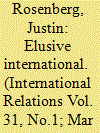

|
|
|
|
|
| Summary/Abstract |
This piece responds to the critical commentaries offered in this forum. I re-state the core aspects of the thesis and emphasize four themes related to theory in response to the critics: (1) Levels of Theory, (2) Locations of Theory, (3) Disciplines of Theory and (4) Ideologies of Theory.
|
|
|
|
|
|
|
|
|
|
|
|
|
|
|
|
| 15 |
ID:
109506
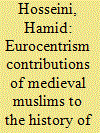

|
|
|
| 16 |
ID:
171917
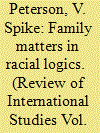

|
|
|
|
|
| Summary/Abstract |
This article seeks to advance our understanding of how intimate relations and racial logics are co-constituted and matter – subjectively, culturally, materially, and politically – in our colonial present of economic inequalities, nationalist populisms, anti-migrant discourses and xenophobic hostilities. Addressing these crisis conditions is urgent, yet critical interventions indicate that prevailing accounts inadequately address the scale, complexity, and fluidity of racisms operating today. This article proposes to think racial logics ‘otherwise’ by drawing on interdisciplinary scholarship and intersectional analytics to produce a genealogy of state/nation formation processes, imperial encounters, and legitimating ideologies that illuminates how ‘intimacy builds worlds’.1 A deep history of political centralisation reveals that regulation of intimate, familial relations is a constitutive feature of successful state-making and crucial for understanding how modernity's ‘race difference’ is produced and how the racialisation of ‘Other’ (‘non-European’, undesirable) sexual/familial practices figures in contemporary crises. Locating intimate relations – ‘family’ – in (birthright) citizenship, immigration regimes, and political-economic frames helps clarify the amplification of global inequalities and the power of stigmatisations to fuel nationalist attachments and anti-migrant hostilities. Foregrounding intimacy and integrating typically disparate lines of inquiry advances our analyses of today's often opaque yet intense racisms and their globally problematic effects.
|
|
|
|
|
|
|
|
|
|
|
|
|
|
|
|
| 17 |
ID:
173124
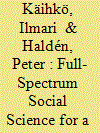

|
|
|
|
|
| Summary/Abstract |
In October 2018, Armed Forces & Society published a special issue dedicated to broadening the perspective on military cohesion from the narrow focus on 20th and 21st Western state militaries and the microlevel. The special issue emphasized the need for a theoretical and methodological broadening of the study of cohesion: In order to understand the majority of armed groups in the world, it is necessary to investigate macro- and mesolevel preconditions of microlevel cohesion. Such preconditions include the existence of states, nations, and modern military organization. These are specific to modern, Western contexts, and rarely feature in historical or non-Western cases. In many cases, investigating these preconditions requires qualitative methods. In a critical response, Siebold contested some of the arguments of the special issue, claiming that our argument was exaggerated and our methodologies inadequate. In this reply, we seek to clarify some of the issues and arguments at stake.
|
|
|
|
|
|
|
|
|
|
|
|
|
|
|
|
| 18 |
ID:
169058
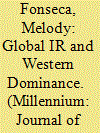

|
|
|
|
|
| Summary/Abstract |
Over the last decade, a call for decolonisation has challenged IR scholarship. The call has advocated for the need to decolonise the epistemology and ontology of the discipline, critically engaging with the legacies of imperialism, colonialism, racism, and patriarchy in global power relations. Parallel to the decolonial project, a call to globalise International Relations has been made by well-known scholars in recent years predominantly through the Global IR project. In this review essay of four books I briefly engage with the debates around Global IR and its critics drawing on a decolonial perspective. On the one hand, I discuss the potentialities and limitations of historiographical deconstruction as a methodological tool, raising issues with the current silencing of the ‘present’ due to the continued coloniality of knowledge. On the other hand, I delve into the wide range of possibilities that a serious and critical commitment to diversifying the discipline of IR might bring to academics in the so-called non-West/Global South. I analyse current critiques of Global IR considering them necessary though, in some cases, agents for the reification and silencing of the interests of the non-West/Global South. I argue that, whilst coloniality operates in multiple ways, decoloniality is also a project that surpasses the ideal total exteriority as imagined through the West/non-West dichotomy.
|
|
|
|
|
|
|
|
|
|
|
|
|
|
|
|
| 19 |
ID:
183223
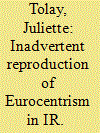

|
|
|
|
|
| Summary/Abstract |
The study of Eurocentrism has become a hallmark of postcolonial International Relations theories. Of particular concern in this literature has been the resilience of Eurocentrism despite conscious efforts to move towards a post-Eurocentric understanding of world politics. This study argues that while existing works have highlighted many of the reasons why Eurocentrism persists today, it has not been sufficiently identified and conceptualised. In particular, why some policy actors, who have a vested interest in moving beyond Eurocentrism, inadvertently reproduce Eurocentrism? This article proposes to distinguish between different types of inadvertent reproductions. In particular it highlights rhetorical critique, deconstruction, decentring and dehierarchising, as different ways to critique, inadvertently reproduce and partially modify Eurocentrism. To illustrate this situation, this article looks at Turkey's migration policies and documents how Turkish governing elites have openly claimed the need to upend the Eurocentric order, yet have reproduced it in practice.
|
|
|
|
|
|
|
|
|
|
|
|
|
|
|
|
| 20 |
ID:
192204
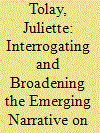

|
|
|
|
|
| Summary/Abstract |
As a promising field of inquiry to understand the nexus between migration and foreign policy, migration diplomacy is rich with studies focusing on the agency of countries in the global South, highlighting the effect of power asymmetries, as well as the existence of a wide range of migration diplomacy practices. This article proposes to take these important contributions even further by opening the field to a wider range of theoretical and epistemological approaches. In particular, this analysis highlights the ahistorical nature and eurocentrism of the field and the extent to which it is based on an unrooted conception of power asymmetries. It also calls for a stronger critique of the field’s focus on material interests, as well as the implicit prioritization of states’ interests. The article encourages further research based on the historical colonial/imperial positionality of different actors to highlight both past and current, visible and invisible practices of migration diplomacy.
|
|
|
|
|
|
|
|
|
|
|
|
|
|
|
|
|
|
|
|
|